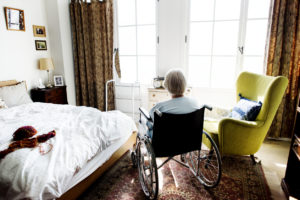 Life is sometimes about having to make difficult choices. One of those choices is deciding when it is time to entrust the care of a loved one to a skilled nursing home facility. There can be a surge of emotions to deal with when making this decision because it can feel like we are abandoning our loved ones in their time of need. What an individual making this decision is really doing is admitting that they don’t have the medical skills necessary to continue to give quality care to their family member. That is not the definition of abandonment, it’s love.
Life is sometimes about having to make difficult choices. One of those choices is deciding when it is time to entrust the care of a loved one to a skilled nursing home facility. There can be a surge of emotions to deal with when making this decision because it can feel like we are abandoning our loved ones in their time of need. What an individual making this decision is really doing is admitting that they don’t have the medical skills necessary to continue to give quality care to their family member. That is not the definition of abandonment, it’s love.
However, some Kentucky nursing homes do engage in the actual act of abandonment. You entrust a loved one’s care to a skilled facility only for them to turn around and leave your loved one on their own. This type of behavior in a nursing home facility isn’t just cruel, it is abuse, and you or your family member may be entitled to compensation because of it.
At Minner Vines Injury Lawyers, PLLC, we believe you and your family deserve better. That’s why we aggressively help you take all legal avenues available for holding nursing homes and their staff responsible for their abusive and negligent actions. Our firm has successfully secured billions of dollars in compensation on behalf of our clients, and our verdicts have ranked among the top U.S. verdicts multiple times. We care about our clients and give each case everything we have.
If you are concerned about a loved one in a nursing home facility, contact Minner Vines Injury Lawyers, PLLC at (859) 550-2900 today to schedule a case evaluation with a nursing home abuse lawyer in Lexington, KY.
Is Abandonment the Same Thing as Neglect?

Abandonment and neglect are often associated with one another, so much so that sometimes the words are used interchangeably to describe a certain type of behavior. However, some distinctions make abandonment different than neglect. Abandonment is considered a different form, or subset, of neglectful behavior. It is most accurately defined as the desertion of an elderly individual by a caregiver. This most commonly happens in a public place, nursing home, or hospital. An assigned caregiver may leave a resident in a recreational area, or outdoors on the grounds of the home, then leave for an extended period of time. This can be a form of abandonment.
Another term that may be used in connection with abandonment is elopement. Elopement is when an elderly patient with cognitive issues or a cognitive condition is abandoned by a caregiver, and they begin wandering around. This is particularly dangerous because those with cognitive conditions such as dementia may become lost, confused, or disorientated.
What Makes Abandonment So Dangerous?
Abandonment is extremely dangerous for all elderly individuals, but especially those with cognitive or physical impairments. By abandoning an elderly resident, a caregiver is basically robbing them of their basic necessities and their right to a safe environment. An elderly resident with a cognitive condition can easily become lost without the help and supervision of a caregiver. They can become seriously injured and have no way to clearly communicate who they are or where they belong.
Abandonment is also dangerous for residents with physical limitations or mobility issues. These individuals can become seriously injured when they try to get out of bed or walk to the restroom and are at a higher risk of suffering from a fall. Abandoning these residents for extended periods of time means they can easily miss getting their needed medication, and even food and water. It is not uncommon for elderly residents who have been abandoned to suffer serious medical issues or injuries in the absence of a caregiver.
Possible Warning Signs of Abandonment
 The AARP finds that the problem of chronic understaffing at nursing home facilities may be one of the main contributing factors when it comes to cases of abuse, especially cases of neglect and abandonment. As many as 75 percent of nursing home facilities have never met the nursing staffing ratios recommended by the Center’s for Medicare & Medicaid Services according to other medical studies. One of the most important questions that you can ask a nursing home is what their patient-to-caregiver ratio is. Too few caregivers for too many residents can be a warning sign that residents may get overlooked by overworked staff or that resources may easily become overwhelmed.
The AARP finds that the problem of chronic understaffing at nursing home facilities may be one of the main contributing factors when it comes to cases of abuse, especially cases of neglect and abandonment. As many as 75 percent of nursing home facilities have never met the nursing staffing ratios recommended by the Center’s for Medicare & Medicaid Services according to other medical studies. One of the most important questions that you can ask a nursing home is what their patient-to-caregiver ratio is. Too few caregivers for too many residents can be a warning sign that residents may get overlooked by overworked staff or that resources may easily become overwhelmed.
There are other warning signs that may point towards nursing home abandonment. Changes in a family member’s demeanor, hygiene, or medical condition may signal that something is wrong, or something is lacking in the care they are receiving. Some common warning signs that a loved one could be suffering from abandonment or some form of nursing home abuse include:
- Multiple falls
- Improper wound care
- Broken bones or dislocated joints
- Bedsores
- Malnutrition
- Dehydration
- Poor hygiene
- Medical complications from not taking their medication
It is also important to note any changes to behavior or attitude. Being chronically abandoned doesn’t just take a toll on the body, it can weigh heavily on the mind as well. A loved one may suddenly become withdrawn, have separation anxiety, have trouble sleeping, or experience changes in their mood or appetite. They may even begin to experience overwhelming feelings of loneliness or isolation. While physical injuries associated with abandonment may be serious, even life-threatening, so can the emotional strain from this form of neglect.
Contact an Experienced Lexington Nursing Home Abuse Lawyer
We hope that the nursing home we select will provide compassionate and kind care to our loved ones. At the bare minimum, nursing home facilities have a duty to provide quality care to their elderly residents. Failing on all levels is inexcusable and may even border on criminals. Nursing homes and the caregivers they employ must be held accountable for abandoning the most vulnerable individuals in their greatest time of need.
If you or a loved one have experienced neglect or abandonment by a caregiver in a Lexington nursing home, you may be entitled to compensation. At Minner Vines Injury Lawyers, PLLC, we care about you and your family. That’s why our attorneys offer compassionate and supportive service to clients and their families. Contact us at (859) 550-2900 to schedule an initial consultation and review the circumstances of your case.